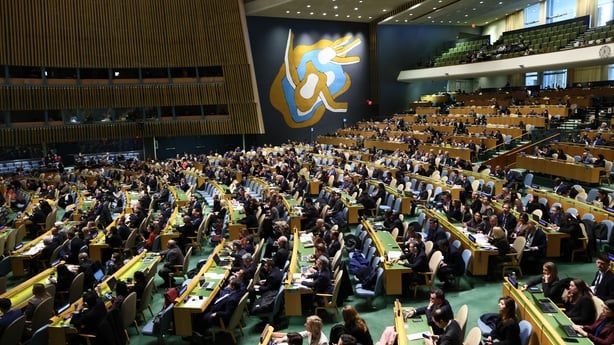The United Nations General Assembly has voted in favour of two rival resolutions on Ukraine - one drafted by Ukraine and another by the United States.
The text drafted by Ukraine and supported by European countries, which reiterated condemnation of Russian aggression and called for the withdrawal of Russian troops from Ukrainian territory, received 93 votes in favour, 18 against and 65 abstentions.
The rival resolution tabled by the United States called for a swift end to the conflict, with no mention of Russian responsibility, but amendments put forward by European nations added language that referenced Russia's "full-scale invasion" and reaffirmed a commitment to Ukraine’s territorial integrity.
The changes prompted the United States to abstain on their own resolution.
The amended version passed with 93 votes in favour, 8 against and 73 absentions.
The US put forward its text on Friday, pitting it against Ukraine and European allies who spent the past month negotiating with their own resolution.

Ahead of the vote, Russia's UN Ambassador Vassily Nebenzia described the US-drafted resolution as a "good move".
Professor at Fordham University in New York Anjali Dayal, also speaking before the vote, said "it is extremely unusual for any major power to switch sides in a conflict like this".
"And it’s unprecedented for the US to produce a draft resolution that’s welcomed by Russia and unwelcome to the US’ traditional allies," she said.
European diplomats, who have been working over several months to garner support for the Ukraine-drafted text, appeared to be caught off guard by the US decision to submit their own text on Friday evening.
"It is hard to not conclude that the US last-minute approach is designed to cause the Europeans maximum embarrassment," said Richard Gowan, UN Director at the Crisis Group.
"It is worth keeping in mind that the US and Europeans frequently split in the General Assembly and Security Council on issues such as Gaza," he said, "but this battle over Ukraine is of another order of diplomatic magnitude given the Europeans' direct interests in the war," he added.
The last few days of Euro-American wrangling over the various draft texts is in stark contrast to the very high level of coordination between the US and Europeans over Ukraine in the Biden era, he said.
The UN General Assembly - made up of 193 member states - previously voted overwhelmingly to condemn Russia’s full-scale invasion of Ukraine and demand the withdrawal of Russian troops.
Unlike in the 15-member Security Council, General Assembly votes are not legally binding but are considered a barometer of global opinion.
Meanwhile the United States threatened to veto any amendments, including by its European allies, to a proposed Security Council resolution that urges a "swift end" to the Ukraine war without mentioning territorial integrity.
"We're going to veto a Russian amendment if it comes to us in the Security Council, we will veto the Europeans' amendments if they come to us in the Security Council," a State Department official said on condition of anonymity.
The official said that President Donald Trump's administration was focused on the Security Council and not a separate earlier vote at the General Assembly to mark the third anniversary of Russia's invasion.
"The intent is to keep the resolution noise-free, thin and to the basics of what the president wants us to do, which is use the United Nations to find a way to peace," the official said.
The four EU members on the Security Council and Britain plan to submit amendments to the text to describe Russia as the aggressor and to insist on Ukraine's territorial integrity, according to a diplomatic source.
Former US president Joe Biden strongly backed Ukraine's territorial integrity and sought to isolate Russia but Trump has shifted gears and proposed normalizing relations with Moscow.
But France and the UK will be reluctant to use their vetoes - last deployed in 1989 - especially this week when the UK Prime Minister Keir Starmer and French President Emmanuel Macron are due to visit US President Donald Trump in Washington.
"We may have an uncomfortable moment where China and Russia vote with the US while the Europeans look on," said Mr Gowan.
Additional reporting AFP







